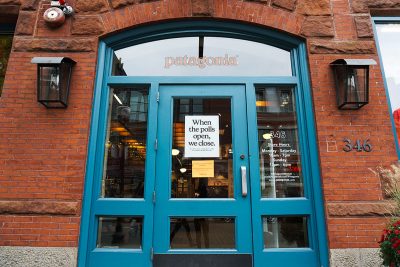
Bostonians hanging out on Newbury Street Tuesday walked past a closed Patagonia store. Amid the typical bustle of the popular street, the store laid vacant with a sign on the door that read, “When the polls open, we close.”
Employees were given time off to vote and use the time to help in the voting process, if so desired.
The “Time To Vote” campaign has partnered with large corporations including Patagonia, Walmart and Nordstrom. In this partnership, CEOs encouraged their employees through various measures such as offering paid time off and meeting-free workdays.
The campaign cites a low voter participation rate as the inspiration behind the movement. About 58 percent of the population of eligible voters in the United States voted in the 2016 general election, and the 2014 midterm election was the lowest turnout since 1942.
Four years ago, only 36.4 percent of voters cast ballots in the midterm elections. Time to Vote, which describes itself as nonpartisan, looks to change that — the companies in the coalition are working together to do this by lessening the pressures of work on people so they can take time to vote.
The campaign works with ElectionDay.org, a site which guides CEOs and business owners through the process of encouraging employees to vote. More than 350 companies have pledged to give their employees paid vacation time through the site.
Time to Vote has also partnered with the TurboVote Challenge. The coalition includes both executive and corporate partners from Facebook, Amazon and Google.
In partnering with these corporations, the TurboVote Challenge seeks to raise voter turnout to 80 percent by the 2024 election, according to its website.
In recent months, tech giants such as Facebook have hosted the TurboVote Challenge on their platforms to encourage voter registration. The site, which has 214 million users in the United States alone, according to Statista, launched a “Vote Now” button feature for the 2016 election that directed users who clicked on it to vote.USA.gov, where they would be guided through registration for their state. Early polling turnout suggests that the voter turnout for the 2018 midterms may break midterm participation records.
As of Friday, the number of early votes casted has already exceeded that of the 2014 midterm’s total number of early voters in 27 states.
In Boston, Patagonia worked to boost voter registration at Open Newbury, where Newbury Street is closed off to cars so that shoppers could experience a “car-free” Newbury.
At the event, Patagonia’s Newbury location teamed with the HeadCount organization. HeadCount, a 15-year-old nonpartisan voter registration organization, set up shop with Patagonia where they helped shoppers register to vote, according to Emma Clayton, floor leader at Patagonia’s Boston location.
The initiatives taken to increase voter turnout by Patagonia stretch far beyond registering to vote, she said, and Patagonia will close its doors on election day and give its employees a paid holiday.
Clayton said that she hopes the initiative will increase participation by doing more than solely having employees vote.
“We don’t come into work,” Clayton said. “We’re encouraged to go vote — even take it one step further and volunteer at a poll or do something to encourage people to vote.”
While other Boston businesses may not close shop or give their employees paid time off on Election Day, Max Clark, assistant bookstore manager at Trident Booksellers and Cafe on Newbury Street, said that the store will remain open, but he feels many of his employees would be out voting.
“I would argue that most of our servers are fairly politically active,” Clark said. “I can only assume, although I don’t talk politics with most of our servers, … that they would make it a priority to go out and vote.”
At Johnson Paint Co., also on Newbury Street, co-owner Robert Johnson said that the staff frequently talks about politics.
“We talk about it all the time,” Johnson said. “You know, we’re pretty close … so we talk about the issues and all that kind of voting.”
While Johnson didn’t designate time for his employees to leave work, he said that he would have no problem with employees that live close by leaving to vote on the afternoon of Nov. 6.
On Boston University’s campus, Tongyue Zhang, a sophomore in the College of General Studies, said that while she thinks people should go vote, she doesn’t believe that employees should have sanctioned time off.
“The employers want their employees to work,” Zhang said. “They should not go during their working time.”


























































































































